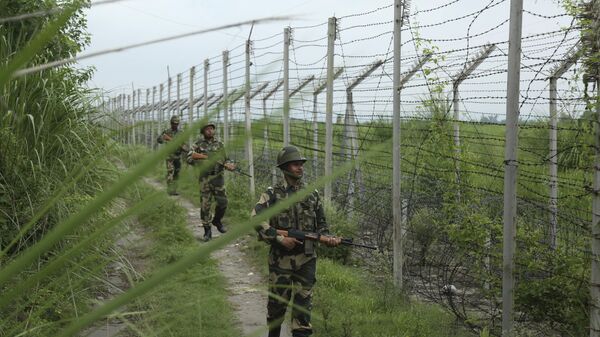At least four civilians have been killed since Thursday and several injured in heavy shelling and firing at different sectors along the Line of Control (LoC), the de-facto border that divides Kashmir between India and Pakistan.
The two sides have blamed each other for inflicting heavy damage on civilian areas. Pakistan's foreign ministry summoned the Indian diplomat on Friday in what has become a weekly ritual since the Indian parliament scrapped the special status of Jammu and Kashmir in August.
Despite the summoning of each other’s diplomats and an awareness that such ceasefire violations may “lead to a strategic miscalculation”, Indian and Pakistani troops have not stopped firing at each other along the LoC..
A worrying development is the high and consistent use of artillery by both sides. In previous periods of tension the use of artillery was quite limited and would usually end up with a flag-meet. But this time, the situation seems different.
Pakistan administered Kashmir a Terrorist Controlled Country: Indian Army chief
Speaking at an army function in New Delhi on Friday, Indian Army Chief General Bipin Rawat categorically stated that Pakistan administered Kashmir is “illegally occupied by Pakistan and being controlled by terrorists.”
“When we say Jammu and Kashmir, the complete state of Jammu and Kashmir includes Pakistan administered Kashmir and Gilgit Baltistan,” General Rawat said, adding the territory illegally occupied by Pakistan “is not controlled by the Pakistani establishment, it is controlled by terrorists. Pakistan administered Kashmir is actually a terrorist controlled country or a terrorist controlled part of Pakistan.''
#Delhi: #Army Chief General #BipinRawat says, "...The territory which has been illegally occupied by Pakistan is not controlled by the #Pakistani establishment, it is controlled by terrorists. PoK is actually a terrorist controlled part of Pakistan." pic.twitter.com/VDXOJcREan
— First India (@thefirstindia) October 25, 2019
General Rawat’s statement is significant as it comes a day after the junior minister in India’s Prime Minister Office (PMO) Jitendra Prasad asserted that the day is not far off when the Indian flag will be unfurled in Pakistan-administered Kashmir.
These statements do not seem to be one off remarks made to cheer up domestic audience during a political rally and India's Foreign Minister and seasoned diplomat S. Jaishankar has also spoken of India's claim to Kashmir.
“My sovereignty and my jurisdiction is laid out by my maps. My maps have been there for over 70 years. Now, that’s my claim,” Jaishankar said to a group at The Heritage Foundation, a conservative think-tank in Washington DC on 2 October.
The Indian foreign minister declared that one day India expects to have physical jurisdiction over its territory presently lying on the Pakistan side since the Instrument of Accession (through which the erstwhile princely State of Jammu and Kashmir acceded to India) was signed in 1947.
Despite raising the stakes, no Indian minister or any top-level member of the ruling Bharatiya Janata Party (BJP) has yet mentioned military options to achieve the desired aim of integrating Pakistan-administered Kashmir into India. But India’s recent trans-border strike on 20 October and war game exercises do indicate that India's armed forces may have plans in that direction.
India Testing New War Strategy for Limited Scale War
Since revoking Kashmir’s special status, India has conducted high-level war games in western (Pakistan) and eastern sector (China) including Ladakh where China claims its jurisdiction as well. On the western front, India has tested its air and land resources including newly inducted K9 self-propelled 155 mm howitzer and PINAKA multi-barrel rocket launcher in the Sudarshan Chakra Integrated Fire and Manoeuvre Exercise.
'Sudarshan Chakra' exercise in Pokhran. Jai Hind ki Sena 🇮🇳 pic.twitter.com/yVLBJicyAJ
— Vinayak (@vinayak_jain) October 23, 2019
On the eastern front, Indian armed forces have carried out two major exercises of newly conceived Integrated Battle Groups (IBGs) just 90 km from the Chinese border. The exercise was aimed to test the mobility, communication and coordination of fast-moving troops for a modern, fast and short war.
The Western Naval Command of the Indian Navy has also started a fortnight-long exercise in the Arabian Sea this week to test “operational preparedness, validate procedures and try out new strategies and concepts of naval operations.”
The Indian Air Force also conducted multiple Brahmos supersonic cruise missile tests earlier this week to assess its operational readiness, while announcing that the missile hit the target at pin-point accuracy.
In the wake of Pakistan Prime Minister Imran Khan making a strong pitch on international platforms and China’s moral support, the Pakistani army too is showcasing its ability to defend its territory.
All said and done, the situation between the two nuclear-armed neighbours seems unlikely to return to nornal anytime soon. Despite the Pakistani prime minister’s diplomatic efforts in foreign lands, no foreign country looks ready to get involved. And, neither Pakistan nor India seems eager to sit across the negotiating table to talk peace.
The views and opinions expressed in the article do not necessarily reflect those of Sputnik.



